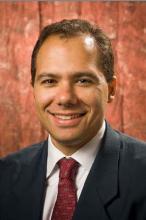User login
The showdown over federal subsidies under the Affordable Care Act commences March 4 as Supreme Court justices prepare to hear arguments in King v. Burwell. The outcome could significantly alter the ACA and impact millions of patients and their physicians.
“King v. Burwell is extremely important to patients and physicians alike,” said Danielle C. Gray, a New York attorney and coauthor of a brief on behalf of the American Academy of Pediatrics (AAP), the American Academy of Family Physicians (AAFP), and other groups in support of the government. “All told, studies predict that a ruling in petitioners’ favor would leave 8 million Americans uninsured and cause premiums to rise by almost 50% for those who continue to purchase insurance on federally facilitated exchanges. Physicians would likely see a significant drop in the number of insured patients, which would affect their treatment options and protocol.”
King supporters argue that the basis of the case is being lost in impact studies and outcome projections. The case is about the meaning of ACA language concerning subsidies and whether the executive branch has the authority to change laws as it sees fit, said Ilya Shapiro a senior fellow in constitutional studies at the Cato Institute, a libertarian public policy organization. The group issued a brief to the high court in support of King.
“A lot of arguments in the litigation and the media concern these sort of nightmare scenarios about people losing coverage. … You see some of that in the amicus briefs supporting the government,” Mr. Shapiro said in an interview. “A lot of them are … just kind of painting nightmare policy scenarios, which really should play no role in how you interpret the law.”
King v. Burwell centers on whether residents in states that rely on the federal marketplace are eligible for tax credits to purchase insurance or whether such assistance can go only to residents who purchase insurance via a state-run marketplace. The ACA states that tax credits apply to insurance purchased through an exchange “established by the state.” Challengers argue the law does not mention the federal exchange and that the subsidies are available only for purchases through state exchanges. The government interprets the ACA to allow subsidies whenever patients buys insurance on any exchange.
The future of the ACA depends on the Supreme Court’s interpretation of the language, said Eric J. Segall, professor of law at Georgia State University, Atlanta. Mr. Segall has written on the merits of King v. Burwell, including a recent opinion in the University of Pennsylvania Law Review.
The basis of the ACA comprises three key components: that insurers provide health insurance without denying coverage to patients with preexisting conditions; that the individual mandate that requires all Americans buy insurance; and that the availability of tax subsidies that ensures lower- and middle-income residents can afford to comply with the mandate.
“That third leg, the subsidies, is just as important as the first two legs,” he said in an interview. “If you cut off any of the three legs, the entire purpose of the Affordable Care Act is undercut and the law would be in serious danger.”
Mr. Segall said that he believes the plaintiffs cannot legally demonstrate that the ACA as a whole, clearly and unambiguously precludes tax credits to people who buy health insurance from federal exchanges. If a law is ambiguous or unclear, an agency’s decision must be upheld if it is reasonable, he notes. Given the structure of the ACA and its reliance on the three essential components, it is a reasonable interpretation that the statute allows for subsidies on both state and federal exchanges, Mr. Segall said.
However, King supporters argue the case should turn on the constitutional principle that neither a federal court nor an executive agency can ignore or override a law’s plain meaning.
“The U.S. Supreme Court believes in clear language, and the language in the law clearly states that the subsidies were available only to an exchange established by the state,” said Sally C. Pipes, president and CEO of the Pacific Research Institute, a San Francisco-based think tank and public policy research institute. The Institute issued a brief in support of King. “By giving subsidies [to] the 37 states that have federal exchanges or exchanges that are jointly operated, it goes against the written intent of the law.”
More than 50 friend of the court briefs have been sent to the high court in support or opposition of King, including comments from the American College of Physicians, the American Thoracic Society and the American Hospital Association. The ACP and its allies urged the court to uphold the premium subsidies created by the ACA in all states.
A Supreme Court ruling to overturn the subsidies would not only disrupt care for millions of patients, but also harm the physician-patient relationship and fuel uncompensated care, said Robert B. Doherty, ACP’s senior vice president for governmental affairs and public policy.
“On a practical level, it would introduce chaos in the patient-physician relationship, especially if an adverse ruling by the Supreme Court took effect immediately, as people – including people, such as cancer patients, who are currently undergoing treatment – immediately lost their coverage, and their physicians and hospitals then have to figure out how to continue to get them the care they need without insurance,” Mr. Doherty said in an interview.
Estimates vary on how many Americans could lose subsidies in 2016 if the high court strikes down the financial assistance. An Urban Institute analysis estimated that just over 6 million people would lose coverage; one from RAND finds that individual-market enrollment would decline by an estimated 10 million people (70%). AvalereHealth found 7.5 million Americans could face a 255% rise in premiums if the Supreme Court strikes down the subsidies, according to a Feb. 26 analysis.
If the Supreme Court sides with King, a congressional fix would be imperative, ACP’s Mr. Doherty said. Another option would be for states that rely on the federal exchange to form their own exchanges in order to retain the subsidies and keep patients covered. But both options pose cost, procedural, and political challenges, Mr. Doherty said in an interview.
“The problem will be that it is hard to envision a fix that a majority of Republicans could support and that would be acceptable to Democrats and President Obama,” he said. “ ... Politics being politics, we could end up with a ‘blame game’ with both sides trying to blame the other for millions of people losing health insurance coverage.”
On Twitter@legal_med
The showdown over federal subsidies under the Affordable Care Act commences March 4 as Supreme Court justices prepare to hear arguments in King v. Burwell. The outcome could significantly alter the ACA and impact millions of patients and their physicians.
“King v. Burwell is extremely important to patients and physicians alike,” said Danielle C. Gray, a New York attorney and coauthor of a brief on behalf of the American Academy of Pediatrics (AAP), the American Academy of Family Physicians (AAFP), and other groups in support of the government. “All told, studies predict that a ruling in petitioners’ favor would leave 8 million Americans uninsured and cause premiums to rise by almost 50% for those who continue to purchase insurance on federally facilitated exchanges. Physicians would likely see a significant drop in the number of insured patients, which would affect their treatment options and protocol.”
King supporters argue that the basis of the case is being lost in impact studies and outcome projections. The case is about the meaning of ACA language concerning subsidies and whether the executive branch has the authority to change laws as it sees fit, said Ilya Shapiro a senior fellow in constitutional studies at the Cato Institute, a libertarian public policy organization. The group issued a brief to the high court in support of King.
“A lot of arguments in the litigation and the media concern these sort of nightmare scenarios about people losing coverage. … You see some of that in the amicus briefs supporting the government,” Mr. Shapiro said in an interview. “A lot of them are … just kind of painting nightmare policy scenarios, which really should play no role in how you interpret the law.”
King v. Burwell centers on whether residents in states that rely on the federal marketplace are eligible for tax credits to purchase insurance or whether such assistance can go only to residents who purchase insurance via a state-run marketplace. The ACA states that tax credits apply to insurance purchased through an exchange “established by the state.” Challengers argue the law does not mention the federal exchange and that the subsidies are available only for purchases through state exchanges. The government interprets the ACA to allow subsidies whenever patients buys insurance on any exchange.
The future of the ACA depends on the Supreme Court’s interpretation of the language, said Eric J. Segall, professor of law at Georgia State University, Atlanta. Mr. Segall has written on the merits of King v. Burwell, including a recent opinion in the University of Pennsylvania Law Review.
The basis of the ACA comprises three key components: that insurers provide health insurance without denying coverage to patients with preexisting conditions; that the individual mandate that requires all Americans buy insurance; and that the availability of tax subsidies that ensures lower- and middle-income residents can afford to comply with the mandate.
“That third leg, the subsidies, is just as important as the first two legs,” he said in an interview. “If you cut off any of the three legs, the entire purpose of the Affordable Care Act is undercut and the law would be in serious danger.”
Mr. Segall said that he believes the plaintiffs cannot legally demonstrate that the ACA as a whole, clearly and unambiguously precludes tax credits to people who buy health insurance from federal exchanges. If a law is ambiguous or unclear, an agency’s decision must be upheld if it is reasonable, he notes. Given the structure of the ACA and its reliance on the three essential components, it is a reasonable interpretation that the statute allows for subsidies on both state and federal exchanges, Mr. Segall said.
However, King supporters argue the case should turn on the constitutional principle that neither a federal court nor an executive agency can ignore or override a law’s plain meaning.
“The U.S. Supreme Court believes in clear language, and the language in the law clearly states that the subsidies were available only to an exchange established by the state,” said Sally C. Pipes, president and CEO of the Pacific Research Institute, a San Francisco-based think tank and public policy research institute. The Institute issued a brief in support of King. “By giving subsidies [to] the 37 states that have federal exchanges or exchanges that are jointly operated, it goes against the written intent of the law.”
More than 50 friend of the court briefs have been sent to the high court in support or opposition of King, including comments from the American College of Physicians, the American Thoracic Society and the American Hospital Association. The ACP and its allies urged the court to uphold the premium subsidies created by the ACA in all states.
A Supreme Court ruling to overturn the subsidies would not only disrupt care for millions of patients, but also harm the physician-patient relationship and fuel uncompensated care, said Robert B. Doherty, ACP’s senior vice president for governmental affairs and public policy.
“On a practical level, it would introduce chaos in the patient-physician relationship, especially if an adverse ruling by the Supreme Court took effect immediately, as people – including people, such as cancer patients, who are currently undergoing treatment – immediately lost their coverage, and their physicians and hospitals then have to figure out how to continue to get them the care they need without insurance,” Mr. Doherty said in an interview.
Estimates vary on how many Americans could lose subsidies in 2016 if the high court strikes down the financial assistance. An Urban Institute analysis estimated that just over 6 million people would lose coverage; one from RAND finds that individual-market enrollment would decline by an estimated 10 million people (70%). AvalereHealth found 7.5 million Americans could face a 255% rise in premiums if the Supreme Court strikes down the subsidies, according to a Feb. 26 analysis.
If the Supreme Court sides with King, a congressional fix would be imperative, ACP’s Mr. Doherty said. Another option would be for states that rely on the federal exchange to form their own exchanges in order to retain the subsidies and keep patients covered. But both options pose cost, procedural, and political challenges, Mr. Doherty said in an interview.
“The problem will be that it is hard to envision a fix that a majority of Republicans could support and that would be acceptable to Democrats and President Obama,” he said. “ ... Politics being politics, we could end up with a ‘blame game’ with both sides trying to blame the other for millions of people losing health insurance coverage.”
On Twitter@legal_med
The showdown over federal subsidies under the Affordable Care Act commences March 4 as Supreme Court justices prepare to hear arguments in King v. Burwell. The outcome could significantly alter the ACA and impact millions of patients and their physicians.
“King v. Burwell is extremely important to patients and physicians alike,” said Danielle C. Gray, a New York attorney and coauthor of a brief on behalf of the American Academy of Pediatrics (AAP), the American Academy of Family Physicians (AAFP), and other groups in support of the government. “All told, studies predict that a ruling in petitioners’ favor would leave 8 million Americans uninsured and cause premiums to rise by almost 50% for those who continue to purchase insurance on federally facilitated exchanges. Physicians would likely see a significant drop in the number of insured patients, which would affect their treatment options and protocol.”
King supporters argue that the basis of the case is being lost in impact studies and outcome projections. The case is about the meaning of ACA language concerning subsidies and whether the executive branch has the authority to change laws as it sees fit, said Ilya Shapiro a senior fellow in constitutional studies at the Cato Institute, a libertarian public policy organization. The group issued a brief to the high court in support of King.
“A lot of arguments in the litigation and the media concern these sort of nightmare scenarios about people losing coverage. … You see some of that in the amicus briefs supporting the government,” Mr. Shapiro said in an interview. “A lot of them are … just kind of painting nightmare policy scenarios, which really should play no role in how you interpret the law.”
King v. Burwell centers on whether residents in states that rely on the federal marketplace are eligible for tax credits to purchase insurance or whether such assistance can go only to residents who purchase insurance via a state-run marketplace. The ACA states that tax credits apply to insurance purchased through an exchange “established by the state.” Challengers argue the law does not mention the federal exchange and that the subsidies are available only for purchases through state exchanges. The government interprets the ACA to allow subsidies whenever patients buys insurance on any exchange.
The future of the ACA depends on the Supreme Court’s interpretation of the language, said Eric J. Segall, professor of law at Georgia State University, Atlanta. Mr. Segall has written on the merits of King v. Burwell, including a recent opinion in the University of Pennsylvania Law Review.
The basis of the ACA comprises three key components: that insurers provide health insurance without denying coverage to patients with preexisting conditions; that the individual mandate that requires all Americans buy insurance; and that the availability of tax subsidies that ensures lower- and middle-income residents can afford to comply with the mandate.
“That third leg, the subsidies, is just as important as the first two legs,” he said in an interview. “If you cut off any of the three legs, the entire purpose of the Affordable Care Act is undercut and the law would be in serious danger.”
Mr. Segall said that he believes the plaintiffs cannot legally demonstrate that the ACA as a whole, clearly and unambiguously precludes tax credits to people who buy health insurance from federal exchanges. If a law is ambiguous or unclear, an agency’s decision must be upheld if it is reasonable, he notes. Given the structure of the ACA and its reliance on the three essential components, it is a reasonable interpretation that the statute allows for subsidies on both state and federal exchanges, Mr. Segall said.
However, King supporters argue the case should turn on the constitutional principle that neither a federal court nor an executive agency can ignore or override a law’s plain meaning.
“The U.S. Supreme Court believes in clear language, and the language in the law clearly states that the subsidies were available only to an exchange established by the state,” said Sally C. Pipes, president and CEO of the Pacific Research Institute, a San Francisco-based think tank and public policy research institute. The Institute issued a brief in support of King. “By giving subsidies [to] the 37 states that have federal exchanges or exchanges that are jointly operated, it goes against the written intent of the law.”
More than 50 friend of the court briefs have been sent to the high court in support or opposition of King, including comments from the American College of Physicians, the American Thoracic Society and the American Hospital Association. The ACP and its allies urged the court to uphold the premium subsidies created by the ACA in all states.
A Supreme Court ruling to overturn the subsidies would not only disrupt care for millions of patients, but also harm the physician-patient relationship and fuel uncompensated care, said Robert B. Doherty, ACP’s senior vice president for governmental affairs and public policy.
“On a practical level, it would introduce chaos in the patient-physician relationship, especially if an adverse ruling by the Supreme Court took effect immediately, as people – including people, such as cancer patients, who are currently undergoing treatment – immediately lost their coverage, and their physicians and hospitals then have to figure out how to continue to get them the care they need without insurance,” Mr. Doherty said in an interview.
Estimates vary on how many Americans could lose subsidies in 2016 if the high court strikes down the financial assistance. An Urban Institute analysis estimated that just over 6 million people would lose coverage; one from RAND finds that individual-market enrollment would decline by an estimated 10 million people (70%). AvalereHealth found 7.5 million Americans could face a 255% rise in premiums if the Supreme Court strikes down the subsidies, according to a Feb. 26 analysis.
If the Supreme Court sides with King, a congressional fix would be imperative, ACP’s Mr. Doherty said. Another option would be for states that rely on the federal exchange to form their own exchanges in order to retain the subsidies and keep patients covered. But both options pose cost, procedural, and political challenges, Mr. Doherty said in an interview.
“The problem will be that it is hard to envision a fix that a majority of Republicans could support and that would be acceptable to Democrats and President Obama,” he said. “ ... Politics being politics, we could end up with a ‘blame game’ with both sides trying to blame the other for millions of people losing health insurance coverage.”
On Twitter@legal_med



